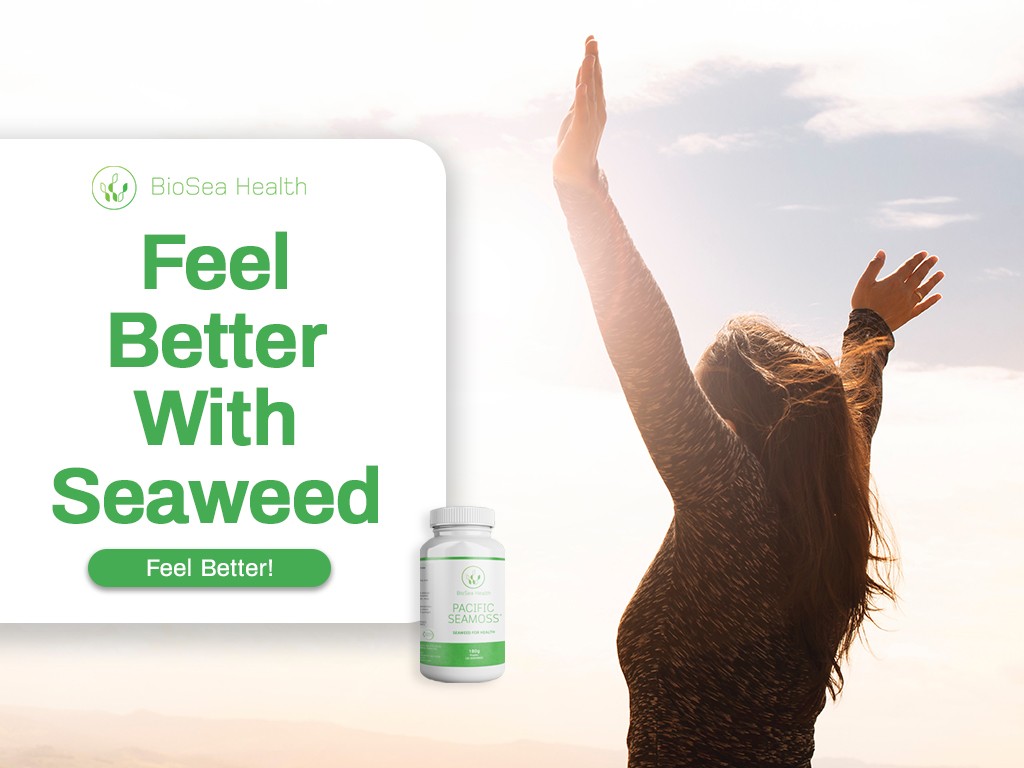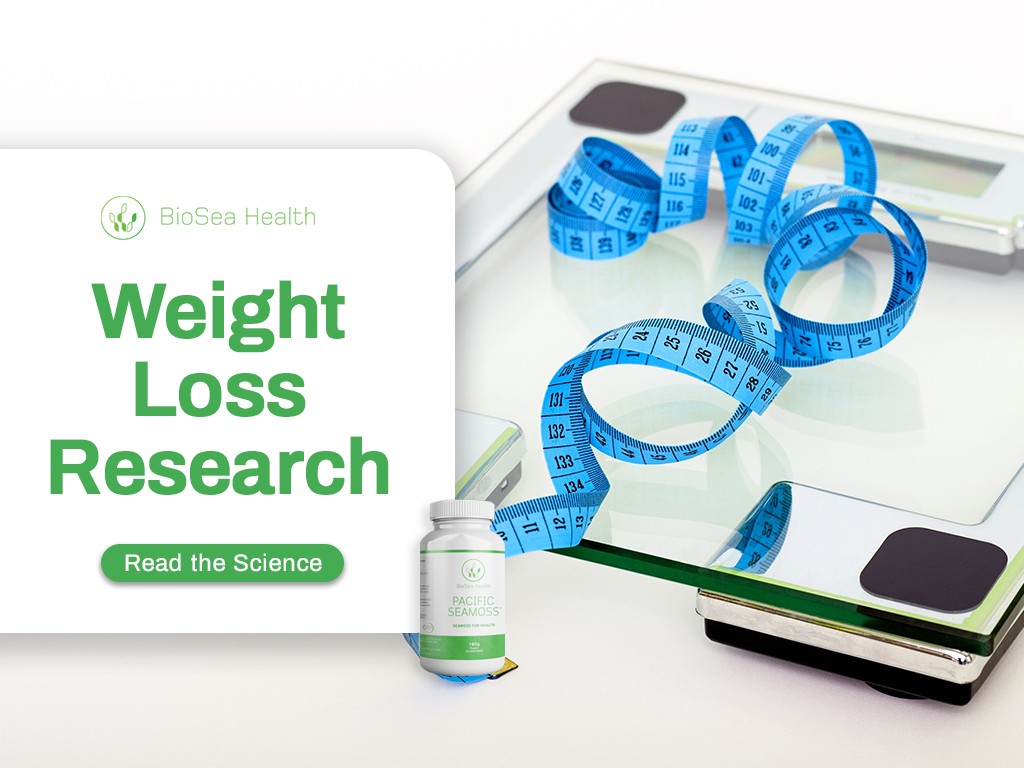Seaweed is a functional food that has prebiotic properties along with novel bioactive compounds. Because of this, seaweed has a wide range of medicinal like properties that counteract the ailments and disease of the modern lifestyle. Eight signs you need seaweed in your life.
1. Panda Eyes
Are you sleeping well but still have dark rings around your eyes? Its probably due to a sluggish liver. Eating a typical western diet can cause a buildup of fatty lobules in the liver, slowing down the important functions of filtration. Toxins increase in the blood stream and we notice this around the eyes. Research from the University of Southern Queensland shows that taking seaweed every day effectively reverses the negative effects of our western diet and removes the fat from our livers. As an added bonus, liver enzymes tests showed a return to optimal functioning even when an unhealthy diet was being consumed. [1]
2. Waistline expanding
We all seem to be in a constant battle with the bulge, especially as we get a little older. Studies have shown that daily intake of seaweed changes the way fats are processed by the body. Seaweed flicks the switch to make the body use fat for energy. It also prevents new fat cells from being created every time we eat just that little bit too much. This all adds up to a drop in waist circumference of up to several centimeters. [1-3]
3. Feeling more tired than usual
Fatigue is a modern-day epidemic that undermines the enjoyment of life at best, but at worst can lead to accidents. Seaweed is a functional food that is rich in bioactive compounds to counter fatigue, no matter the cause. Fatigue from an underperforming thyroid is alleviated by the building blocks of thyroid hormone, iodine and tyrosine found in natural balance in seaweed. Tyrosine is also needed to produce neurotransmitters dopamine and noradrenaline which allow our brains to function better when under stress. [4]
4. Harder to remember things- Seaweed in your life
Most of us see memory problems are inevitable as we get older, but this is not necessarily the case. A team of scientists from Korea have shown that seaweed can repair neurons on the brain and increase neural networks that are necessary for memory. That study also found that neurons were able to better manufacture and store the neurotransmitters necessary for faster mental processing. [5]
5. Aching Joints – Seaweed in your life
Inflammation in the joints can happen at any age, with causes ranging from mild injury to overuse or arthritis. For centuries seaweed has been used in traditional medicine as an anti-inflammatory but now modern science is demonstrating just how effective it is. One study described the compounds from seaweed as having a greater anti-inflammatory capacity than aspirin. [6] The benefit of seaweed is that it doesn’t have the side-effects seen in many anti-inflammatory drugs, such as damage to the stomach lining. Check out the surprising testimonies.
6. Blood pressure creeping up
Hypertension is another “lifestyle” disease that has a myriad of causes – western diet, stress, lack of exercise, age or genetics. It is a leading “modifiable risk-factor” factor that increases the probability of death from heart attack, stroke or heart failure. Anyone who has been diagnosed with hypertension knows how difficult it is to lower your blood pressure, even when medicated. The good news is taking seaweed every day has been shown to reduce systolic ( the first number) blood pressure back to normal values. [1] Check your blood pressure
7. Painful periods
Contractions of the uterus can create sever and debilitating pain. Many women suffer from pain so great they are unable to work or function normally during a menstrual period. Seaweed has a high level of natural potassium that reduces smooth muscle contractions and restores the sodium potassium balance in the body. While the uterus still contracts during menstruation, it is far less extreme so pain is significantly reduced. [1]
8. You’re over 50 – you need seaweed in your life
Fifty seems to be the magic number when lifestyle and genetics start to catch up with us. Cardiovascular disease, cancer, and diabetes suddenly loom large in our lives, and in the minds of our general practitioners. Countries that have a high consumption of seaweed, like Japan, have a decreased risk of all these major diseases.[7] This is probably why these same countries have so many healthy, active people in the 80s, 90s and 100s. Interestingly, studies have shown that when these people change to a western diet their biological markers, like blood pressure, shift to a level similar to those raised in the western world. [7]
References
[1] S. Wanyonyi, R. Du Preez, L. Brown, N. A. Paul, and S. K. Panchal, “Kappaphycus alvarezii as a food supplement prevents diet-induced metabolic syndrome in rats,” Nutrients, vol. 9, no. 11, p. 1261, 2017. (Pubmed)
[2] J. Teas, M. E. Baldeón, D. E. Chiriboga, J. R. Davis, A. J. Sarriés, and L. E. Braverman, “Could dietary seaweed reverse the metabolic syndrome?,” Asia Pacific journal of clinical nutrition, vol. 18, no. 2, p. 145, 2009.(Pubmed)
[3] Y. X. Chin, Y. Mi, W. X. Cao, P. E. Lim, C. H. Xue, and Q. J. Tang, “A pilot study on anti-obesity mechanisms of Kappaphycus alvarezii: The role of native κ-carrageenan and the leftover sans-carrageenan fraction,” Nutrients, vol. 11, no. 5, p. 1133, 2019.
[4] M. L. Cornish, A. T. Critchley, and O. G. Mouritsen, “Consumption of seaweeds and the human brain,” Journal of Applied Phycology, vol. 29, no. 5, pp. 2377-2398, 2017.
[5] G. Tirtawijaya et al., “Spinogenesis and Synaptogenesis Effects of the Red Seaweed Kappaphycus alvarezii and Its Isolated Cholesterol on Hippocampal Neuron Cultures,” Preventive Nutrition and Food Science, vol. 24, no. 4, p. 418, 2019.
[6] F. Makkar and K. Chakraborty, “Antidiabetic and anti-inflammatory potential of sulphated polygalactans from red seaweeds Kappaphycus alvarezii and Gracilaria opuntia,” International Journal of Food Properties, vol. 20, no. 6, pp. 1326-1337, 2017.
[7] E. M. Brown et al., “Seaweed and human health,” Nutrition reviews, vol. 72, no. 3, pp. 205-216, 2014.







